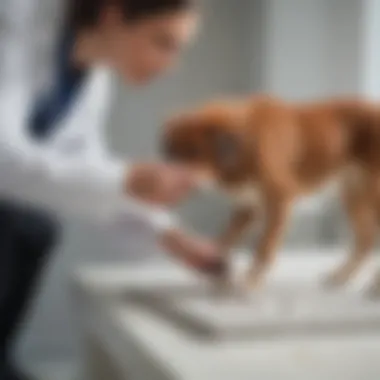Effective Solutions for Your Dog's Runny Poop Issues


Intro
Dealing with a dog's runny poop can create a lot of worry for pet owners. It's a common issue that can arise from various factors, including diet, stress, or even an underlying health condition. Understanding what to give your dog when they have runny stools is crucial for their well-being. Having a prepared strategy helps in managing their discomfort and ensuring they are healthy.
This section will explore the best practices for tackling runny poop. We will highlight dietary adjustments and natural remedies that can help stabilize your dog's stool. Moreover, it is vital to recognize when professional veterinary care is necessary. This careful approach ensures not only quick relief for your pet but also a path towards long-term health.
Understanding Your Pet
Breed Traits
Different dog breeds can have unique sensitivities. For example, certain breeds may experience gastrointestinal issues more frequently. Breeds like the Labrador Retriever or Beagle may be more prone due to their eating habits. Recognizing breed-specific tendencies can guide you in addressing runny poop the right way.
Common Temperaments
The temperament of your dog also plays a role. An anxious dog can suffer from diarrhea during stressful situations, like loud noises or new environments. Being aware of your pet's temperament can aid in preventing future episodes. Consistent routines and a calm environment help reduce stress-related digestive issues.
Special Needs
Some dogs may have special dietary needs or allergies. Determining if your dog has any allergies can involve consulting with your vet about their dietary history. A proper test can reveal sensitivities to grains or meats that could be causing the runny stool.
Nutrition and Feeding Guidelines
Proper nutrition is essential. It's not just about what to give your dog when they have runny poop, but also about maintaining a balanced diet.
- High-Quality Food: Select dog food that emphasizes quality protein and limited fillers. Look for brands like Royal Canin or Hill's Science Diet.
- Gradual Changes: If dietary change is necessary, introduce the new food gradually to avoid further upset.
- Hydration: Always ensure your dog has access to fresh water to prevent dehydration, which can occur with diarrhea.
Foods to Consider
- Plain, boiled chicken and rice can provide easy-to-digest nutrients when a dog has runny poop.
- Canned pumpkin is often recommended. It has natural fiber that helps firm up stool.
- Probiotics can be beneficial for sustaining gut health.
Recognizing When to Consult a Vet
It's important to know when to take action beyond home remedies. Runny poop might resolve quickly, but persistent diarrhea requires a vet’s attention. Seek veterinary care if you notice:
- Blood in stool
- Vomiting or lethargy
- If diarrhea continues for more than a day
Always prioritize your pet's health over self-treatment. When in doubt, consult a professional.
Culmination
Understanding what to give your dog for runny poop can significantly impact their recovery. By focusing on quality nutrition, recognizing breed traits, and knowing when to seek veterinary help, owners can effectively manage this common issue. Keeping your pet healthy should always be the top priority.
Understanding Runny Poop in Dogs
Understanding runny poop in dogs is vital for every pet owner. Diarrhea, while common, can indicate underlying health issues. Knowledge about this topic empowers owners to make informed decisions. Recognizing causes and symptoms can lead to timely interventions, ensuring your dog remains healthy.
Common Causes of Diarrhea
Dietary indiscretion
Dietary indiscretion refers to your dog eating something they shouldn’t. This could be human food, spoiled items, or foreign objects. This is a frequent cause of diarrhea. Pets are curious by nature, so they tend to sample whatever they find. This behavior makes dietary indiscretion a common issue. It is essential to monitor their eating habits.
Advantages include awareness of what your dog consumes, leading to preventive measures. However, it can also lead to sudden and severe gastrointestinal upset.
Food allergies or intolerances
Food allergies or intolerances occur when the immune system reacts to specific ingredients. Common allergens include beef, chicken, dairy, and grains. Identifying these problems is crucial for managing your dog’s diet. Recognizing a food allergy helps in choosing suitable food options, thus improving overall health.
The advantage of understanding this issue ensures you provide a diet tailored to your pet’s needs. However, it may take time to identify allergens, during which your dog may suffer from symptoms.
Parasitic infections
Parasitic infections can cause diarrhea due to worms like Giardia or roundworms. Dogs can acquire these parasites from contaminated food or water. These infections are harmful. Recognizing symptoms early can lead to prompt treatment.
The benefit of understanding this is being able to seek veterinary care quickly. This is vital for your dog's health. The downside includes potential complications if not treated timely.


Bacterial infections
Bacterial infections, such as Salmonella or E. coli, can cause severe diarrhea. These infections can come from raw or contaminated food. Keeping your dog’s environment clean helps reduce this risk. Timely treatment after detection is essential.
Understanding this aspect allows for proactive measures against potential infections. The challenge lies in distinguishing between bacterial and non-bacterial causes of diarrhea.
Viral infections
Viral infections, such as parvovirus, can also lead to diarrhea. These infections are serious and can be life-threatening. Vaccinations are necessary to prevent them. Recognizing symptoms early should prompt an immediate vet visit.
The key feature is that these infections require urgent care. However, preventive measures through vaccinations can significantly reduce risks.
Symptoms Accompanying Diarrhea
Vomiting
Vomiting often accompanies diarrhea. It indicates possible gastrointestinal distress. Observing your pet’s overall condition is crucial. Identifying vomiting can help assess the severity of the situation. Common reactions include stress and bloating. It's essential to monitor how often it occurs.
The benefit of recognizing vomiting allows for accurate documentation of symptoms for veterinary consultation. It adds complexity when determining the underlying cause of diarrhea.
Lethargy
Lethargy is another concerning symptom. If your dog is unusually tired or inactive, it could indicate more significant issues. Assessing the level of lethargy helps determine whether to seek veterinary care.
Being aware of lethargy aids in understanding your dog’s health status. However, it may also indicate a wide range of potential issues.
A decreased appetite
A decreased appetite can be a sign of distress. Dogs may stop eating due to discomfort from diarrhea. This symptom can lead to weight loss if not addressed. Monitoring your dog's eating habits is important.
Recognizing this allows for early interventions, preventing long-term health consequences. Nonetheless, appetite changes may not always correlate with the severity of the diarrhea.
Weight loss
Weight loss during diarrhea can be alarming. It signals that your dog may not be absorbing nutrients properly. Observing for this symptom aids in monitoring your dog’s health.
Identifying weight loss promotes timely health assessments. However, weight loss can occur for various reasons, necessitating further examination by a veterinarian.
Dehydration
Dehydration is a serious concern for dogs with runny stool. It can occur quickly and can be life-threatening. Always ensure your dog has access to fresh water. Calculating body weight loss can assist in assessing dehydration levels.
Recognizing dehydration encourages prompt hydration solutions, such as electrolyte solutions. This aspect complicates the situation, as dehydration often needs immediate action.
Immediate Dietary Adjustments
Managing a dog's runny poop requires immediate dietary adjustments. Making the right changes can greatly influence your dog's recovery and comfort. The goal here is to stabilize the digestive system and ensure the dog receives nutrients without aggravating the situation. Choosing gentle, easily digestible foods is crucial. This is where bland diets and hydration considerations come into play, aiding in the dog's recovery.
Bland Diet Recommendations
Boiled chicken and rice
Boiled chicken and rice is a frequently recommended dish for dogs experiencing diarrhea. The combination is easy to digest and low in fiber, which helps to firm up stool. A key characteristic of this food is its blandness; it does not irritate the stomach. For many pet owners, this makes it a simple and effective choice. However, it's important to ensure that the chicken is skinless and boneless to avoid any unnecessary fats. The unique feature of this diet is its balance of protein and carbohydrates while being gentle on the digestive tract. While most dogs enjoy the taste, a downside is that it may not provide all essential nutrients if fed long-term.
Plain pumpkin
Plain pumpkin is another beneficial option for dogs with runny stools. Its high fiber content helps absorb excess water in the intestines, which can lead to firmer stools. The key characteristic of plain pumpkin is that it is naturally low in calories and provides necessary vitamins. Many dog owners find it an easy addition to their pet's diet, as it usually is appealing to dogs. However, you must ensure it is plain canned pumpkin or cooked, without added sugars and spices. The unique aspect of using pumpkin is its soluble fiber, which can regulate bowel movements. Take care, though, as overfeeding may result in further digestive upset.
Sweet potatoes
Sweet potatoes are nutritious and versatile, often welcomed in a dog's diet. They are high in fiber and rich in vitamins, providing a good option for those with digestive issues. One key characteristic of sweet potatoes is their gentle nature, making them easier to digest. Many dogs enjoy their taste, making it a palatable option. A unique feature is that they can be served either mashed or cooked, adding variety. However, moderation is important, as too much can lead to gas or bloating.
Rice water
Rice water is essentially the water left after boiling rice. This fluid can be beneficial for dogs suffering from diarrhea. The key aspect of rice water is its ability to hydrate while supplying some nutrition. It serves to soothe the digestive system and can help bind stools. This makes it a good choice during digestive distress. Its unique advantage lies in providing hydration without forcing the dog to eat food that could irritate their stomach further. However, relying solely on rice water for nutrition in the long term is not advisable.
Hydration Considerations


Importance of fresh water
Maintaining proper hydration is crucial when addressing runny poop in dogs. Fresh water should always be available to help prevent dehydration, which can occur easily in these situations. The key characteristic of fresh water is that it helps flush out toxins and aids in digestion. Keeping your dog hydrated is important for recovery without stressing their system. Unique benefits include promoting overall health and aiding in the absorption of nutrients from the bland diet. On the downside, some dogs may not drink enough if they feel unwell.
Electrolyte solutions
Electrolyte solutions designed for pets can be beneficial in cases of severe diarrhea. They help replace lost salts and fluids, making a significant difference in restoring balance. Their key characteristic is the swift rehydration they provide, which is essential for recovery. Many pet owners view this as a beneficial choice if dehydration is evident. One notable feature is that these solutions are formulated to be palatable. However, improper use or excessive reliance can lead to an imbalance of electrolytes.
Restricting intake during acute diarrhea
In certain cases, restricting food intake during acute episodes of diarrhea can be beneficial. This allows the digestive system to rest and recover. The main aspect to consider is that it focuses on healing rather than overwhelming the body's systems. A notable characteristic is that it is a temporary measure aimed at recovery. It can be particularly beneficial for dogs recovering from intense digestive distress. However, monitoring is essential, and longer restrictions should not happen without veterinary advice.
Probiotic Supplements for Dogs
Probiotic supplements can play a crucial role in managing runny poop in dogs. These products help maintain and restore a healthy gut environment. Understanding their benefits and types can aid in making informed decisions about your pet's health.
Benefits of Probiotics
Restoring gut flora
Restoring gut flora is essential for pets experiencing digestion issues. When a dog's gut flora is balanced, it promotes healthy digestion. This can be especially important after episodes of diarrhea. Probiotics contain live beneficial bacteria that help replenish lost flora. They are a popular choice among dog owners because they can lead to quick improvements in stool consistency. However, it is important to choose high-quality probiotics to ensure effectiveness.
Improving digestion
Improving digestion is another significant benefit of probiotics. An enhanced digestive process means that the dog can absorb nutrients more efficiently. This becomes vital during recovery from runny poop. Probiotics not only ease the digestive process but also promote better nutrient absorption. This leads to overall better health for your pet. However, it is worth noting that not all probiotics work the same way for every dog, so monitoring your pet's reaction is key.
Reducing gastrointestinal upset
Reducing gastrointestinal upset is a key outcome of introducing probiotics. They help in calming an inflamed gut and reducing discomfort. Many owners find that probiotics can help manage and prevent future occurrences of diarrhea. This makes them a beneficial addition to a dog's diet, especially during stressful situations. As with any supplement, ensure you discuss it with a vet, as not all dogs may need probiotics.
Types of Probiotic Supplements
Powders vs.
capsules
Choosing between powders and capsules is vital. Powders can easily mix into food, making them more user-friendly for pets that might be hesitant to take pills. Capsules, on the other hand, offer a concentrated dose of probiotics. Both forms have their benefits. A powder may be preferable for picky eaters, while capsules might be easier for measuring exact doses. Owners should assess which method works best for their dog.
Probiotic-rich foods
Probiotic-rich foods can also be an option for enhancing gut health. Foods like plain yogurt or kefir can introduce beneficial bacteria into the dog's diet. Including these foods can provide a natural way to rebalance gut flora. However, some dogs are lactose intolerant, and it is important to monitor their reactions. Alternatives like fermented vegetables can be considered as well, ensuring that they suit the dog's digestive system.
Choosing the right supplement
Choosing the right supplement is crucial when looking for probiotics. It’s essential to check for certain characteristics. Look for products that specify the strains of bacteria and the number of colony-forming units (CFUs). A high-quality probiotic will have a diverse range of strains. This ensures that the product can effectively benefit your dog's specific needs. Consulting a veterinarian can help guide your choice based on your dog’s health history and current condition.
When to Consult a Veterinarian
It's crucial to understand when a situation requires professional guidance in regards to dog health, particularly concerning runny poop. While occasional diarrhea might be manageable through at-home remedies and temporary dietary adjustments, certain signs indicate that veterinary intervention is necessary. Recognizing these symptoms can not only ensure your dog's well-being but also save time in treatment and potentially minimize complications.
Signs Needing Immediate Attention
Bloody stools
Bloody stools can be alarming for any dog owner. This symptom indicates that there might be significant internal issues like intestinal injury or a serious infection. The presence of blood is distressing and signifies that the gastrointestinal tract may be compromised. Addressing this situation promptly is essential, as delays could lead to worsened health conditions for the dog.
Persistent diarrhea exceeding hours
When diarrhea persists beyond 24 hours, it becomes a serious concern. This duration suggests that the underlying cause is more than just a minor digestive upset. Prolonged diarrhea can lead to dehydration, making it necessary to consult a veterinarian. Ignoring this sign can exacerbate the dog’s condition, leading to serious health risks.
Severe abdominal pain
Severe abdominal pain should never be overlooked. If a dog exhibits signs of distress, such as whining, restlessness, or reluctance to be touched, this indicates a possible serious underlying condition. Severe abdominal pain can often signify issues like pancreatitis or obstructions, which require urgent veterinary attention. The sooner treatment is sought, the better the prognosis for recovery.
Fever


A fever, defined as an elevated body temperature, can be indicative of various infections or illnesses. If the dog's temperature rises above the normal range, or if it displays lethargy paired with elevated body temperature, it is important to consult a veterinarian. Fever can be a sign that the body is fighting off an infection, and timely medical intervention often helps in resolving the underlying condition.
Diagnostic Tests and Procedures
Fecal exams
Fecal exams are a standard procedure that provides insightful information regarding your dog’s digestive health. This test helps identify parasites, bacteria, or other abnormalities in the stool. By evaluating the fecal matter, veterinarians can pinpoint the exact cause of runny poop. Fecal exams are non-invasive and typically quickly done, making them a beneficial first step in diagnosing diarrhea and similar issues.
Blood tests
Blood tests can offer a comprehensive view of your dog’s overall health. They help detect infections, organ function abnormalities, and other systemic issues. By analyzing blood samples, veterinarians can determine underlying causes of diarrhea and associated symptoms. This diagnostic method is essential for identifying conditions that may not present noticeable symptoms in the early stages.
X-rays or ultrasounds
X-rays or ultrasounds provide detailed images of internal organs and structures within your dog’s abdominal cavity. These imaging techniques are crucial for diagnosing obstructions, tumors, or other serious conditions that may contribute to gastrointestinal symptoms. While these procedures are often more invasive than fecal exams or blood tests, they are invaluable for visualizing potential underlying health problems.
It's vital to act quickly when your dog shows serious symptoms. Early intervention often leads to better outcomes.
Preventive Measures for Future Incidents
Preventive measures are vital for maintaining your dog's health and well-being. A proactive approach can reduce the likelihood of runny poop incidents and overall gastrointestinal issues. This section focuses on key strategies, emphasizing the importance of establishing a routine diet and scheduling regular vet check-ups.
Establishing a Routine Diet
Establishing a routine diet contributes significantly to your dog's digestive health. A consistent diet helps to keep their gastrointestinal system stable and less prone to disturbances.
Choosing high-quality dog food
Choosing high-quality dog food is a fundamental aspect of your pet's routine diet. High-quality dog food often contains balanced nutrients, ensuring that your dog receives adequate vitamins and minerals for optimal health. This is a beneficial choice to reduce the risk of diarrhea since superior ingredients can aid in digestion and promote a healthy gut. Moreover, many high-quality options avoid fillers and artificial additives that could trigger sensitivities in some dogs. However, not all expensive brands guarantee quality, so careful selection is crucial.
Gradual changes to diet
Gradual changes to diet are essential when introducing new food. A sudden switch can lead to digestive upset and result in diarrhea. When you decide to change your dog’s food, do it slowly over a week or more. This approach minimizes disruption in their digestive system. The goal is to balance the old food with the new, allowing your dog's stomach to adjust. However, even with gradual changes, some pets may still be sensitive to specific ingredients in new food.
Monitoring food labels for allergens
Monitoring food labels for allergens is crucial for preventing adverse reactions in your dog. Many dogs suffer from food allergies that can cause gastrointestinal disturbances, including runny poop. By paying attention to labels, you can identify potential allergens and select foods that meet your dog’s needs. This process also aids in choosing grain-free or limited-ingredient diets that can benefit dogs with known sensitivities. However, reading labels can be overwhelming, especially with varying terms and practices in the pet food industry.
Regular Vet Check-ups
Regular vet check-ups play an important role in maintaining your dog's overall health and preventing chronic issues that could lead to diarrhea. These visits allow for early detection of potential health problems and ensure your dog is up-to-date on vaccinations and preventive care.
Annual wellness exams
Annual wellness exams are valuable for tracking your dog's health over time. These check-ups include thorough physical examinations and discussions about your dog's dietary habits. By routinely evaluating your pet's condition, veterinarians can catch early signs of health issues. A downside might be the costs associated with regular visits, but the long-term benefits often outweigh these expenses.
Vaccination schedules
Vaccination schedules are critical for preventing serious diseases that can lead to gastrointestinal problems. Keeping your dog vaccinated helps to protect them from infections that could manifest as diarrhea. Adhering to vaccination schedules set by your veterinarian helps ensure comprehensive coverage against common viral and bacterial illnesses. Missing vaccinations can result in unexpected health issues for your dog.
Parasite prevention protocols
Parasite prevention protocols are another significant aspect of your dog's health care routine. Regular use of preventative measures against parasites such as worms, fleas, and ticks can minimize risks of infections that lead to gastrointestinal upset. By preventing these infestations, you create a healthier environment for your dog. Some owners may find these prevention methods cumbersome, but their positive effects on your pet's health are undeniable.
The End
Addressing runny poop in dogs is essential for maintaining the overall health and well-being of your pet. Understanding the potential causes and implementing appropriate dietary changes can significantly impact recovery. This article explored several strategies, including the value of a bland diet, the benefits of probiotics, and the need for veterinary consultations when necessary.
Furthermore, prevention is critical. Establishing a routine diet, regular vet check-ups, and being mindful of the ingredients in dog food can lead to fewer gastrointestinal issues. Each dog is unique, and their needs can vary, making it imperative to pay close attention to their reaction to different foods.
A proactive approach allows for quicker responses to any arising health issues, minimizing discomfort for your pet.
Summary of Key Points
- Runny poop can stem from various causes, such as dietary indiscretion, infections, or allergies.
- Immediate dietary adjustments, like introducing a bland diet, may ease symptoms.
- Probiotics can positively influence gut health and digestion.
- Recognizing when veterinary help is needed is crucial for effective management.
- Preventive measures play a vital role in minimizing future occurrences of gastrointestinal issues.
Encouragement for Responsible Pet Ownership
Owning a pet comes with great responsibility. It's essential to remain aware of your dog's health signs and behaviors. Running stool may seem trivial, but it can signify serious underlying issues. Regular vet visits and staying informed will help you provide the best care possible.
Engage actively with your pet's diet and nutrition. Quality ingredients make a difference. Look for dog foods that have real meat and proper nutrients while avoiding fillers and allergens.
Being a responsible pet owner means understanding and anticipating your dog's needs. Commitment to their well-being will result in not only a healthier pet but also a happier one.



